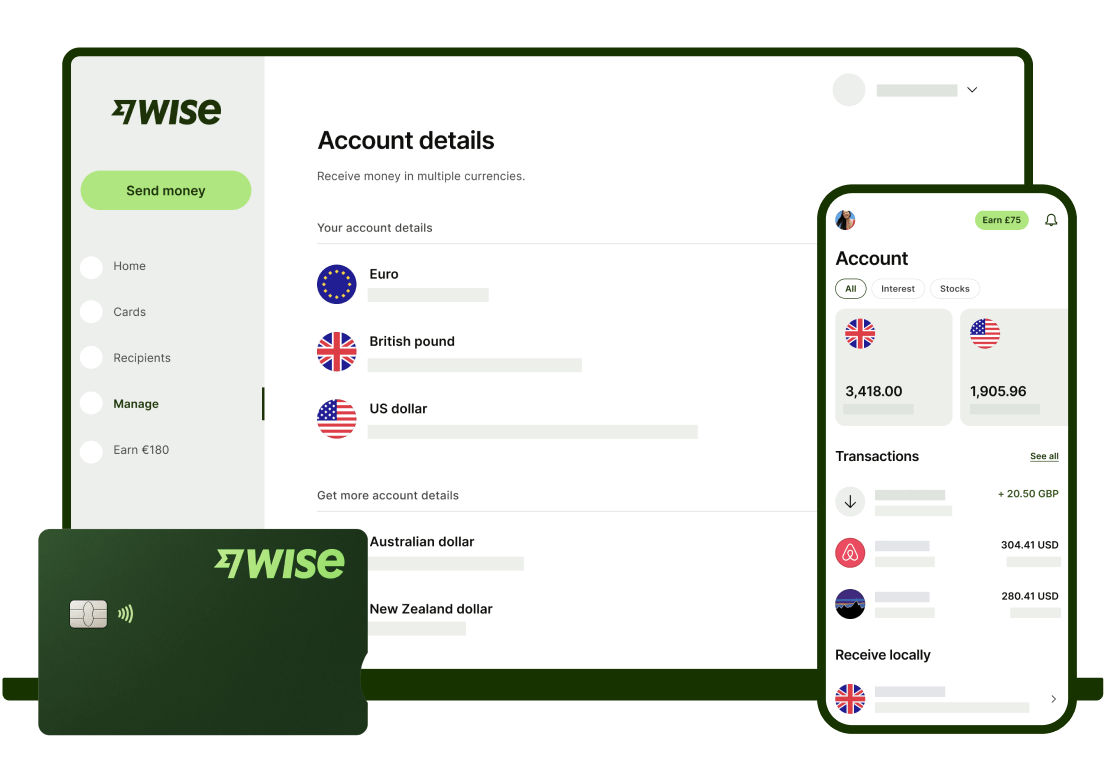5 Ways to Stand Out and Boost Black Friday Sales
Black Friday is the day after Thanksgiving, falling on Friday 29th November in 2024. It’s known for being a perfect time for snagging a bargain, opening the...

Looking for up to date information about how to travel for business from the UK, post Brexit?
The EU is the UK’s biggest trading partner - making up nearly 50% of foreign trade¹, including high levels of exports and imports of goods such as machinery, cars and chemicals. So it’s no wonder that many UK businesses have to arrange frequent business travel to the EU for meetings, conferences, negotiations and more.
This guide covers how to travel to Europe from the UK for business - and also introduces handy ways to cut your costs with Wise Business multi-currency account
| 📝 Table of contents: |
|---|
Let’s start with the basics. Travelling for business usually refers to taking a trip on behalf of your UK employer. That could be for reasons including:
Business travel isn’t the same as working overseas. If you’re intending to get paid by a foreign employer, or plan to stay long term working abroad, you’ll usually need a different visa and permit.
Prior to Brexit, the UK was part of the EU, and therefore British citizens in most cases enjoyed free movement with no visas required, across any other EU states. Since leaving the EU, the rules around travel between the UK and Europe have changed.
In many cases, short term business visitors to the EU will not require a specific business visit visa. However, whether or not you need any visa to enter or remain in the EU will depend in part on how long you stay. Rules on passport validity also changed with Brexit - we’ll cover this in more detail later.
Much of the EU, excluding Bulgaria, Cyprus, Ireland and Romania is part of what’s called the Schengen area.² Visitors from the UK do not usually need a visa to enter the Schengen area as long as they will remain for less than 90 days in a rolling 180 day period.
From the UK, visitors can also usually enter the non-Schengen EU countries visa free, and time spent in these countries does not contribute to the maximum 90 day stay in the Schengen area.
The 90 day maximum stay includes all travel to Schengen member countries. That means that both business and leisure travel is included in the calculation - so if you’re taking a holiday to Spain and then heading off for business travel to France both periods of time add up towards the maximum 90 day allowed stay.
If you’ll be in the Schengen area for over 90 days in any 180 day period, you’ll need to apply for a visa to cover your stay.
The countries which are part of the European Union are as follows³:
| Country | Schengen area | Currency |
|---|---|---|
| Austria | ✅ | Euro (EUR) |
| Belgium | ✅ | Euro (EUR) |
| Bulgaria | ❌ | Bulgarian Lev (BGN) |
| Croatia | ✅ | Euro (EUR) |
| Republic of Cyprus | ❌ | Euro (EUR) |
| Czech Republic | ✅ | Czech Koruna (CZK) |
| Denmark | ✅ | Danish Krone (DKK) |
| Estonia | ✅ | Euro (EUR) |
| Finland | ✅ | Euro (EUR) |
| France | ✅ | Euro (EUR) |
| Germany | ✅ | Euro (EUR) |
| Greece | ✅ | Euro (EUR) |
| Hungary | ✅ | Hungarian Forint (HUF) |
| Ireland | ❌ | Euro (EUR) |
| Italy | ✅ | Euro (EUR) |
| Latvia | ✅ | Euro (EUR) |
| Lithuania | ✅ | Euro (EUR) |
| Luxembourg | ✅ | Euro (EUR) |
| Malta | ✅ | Euro (EUR) |
| Netherlands | ✅ | Euro (EUR) |
| Poland | ✅ | Polish Zloty (PLN) |
| Portugal | ✅ | Euro (EUR) |
| Romania | ❌ | Romanian Leu (RON) |
| Slovakia | ✅ | Euro (EUR) |
| Slovenia | ✅ | Euro (EUR) |
| Spain | ✅ | Euro (EUR) |
| Sweden | ✅ | Swedish Krona (SEK) |
Visa rules do change from time to time, so it’s important to get the latest UK government Brexit guidance⁴ online before you travel.
Planning business travel to the EU? To make the most of your trip, you’ll need to make sure you have everything lined up in advance. That includes planning:
Visa and documents: if you’ll be staying in Europe for 90 days or less in a 180 day period, you may not need a specific visa, but rules still apply covering the documents and paperwork you do need, so make sure you’ve read country specific advice before you travel.
Transportation: the best way to get to the EU, and to get around when you’re there, will depend a lot on the country you’re headed to. Flying is often the most convenient option, but train travel throughout much of Europe is also convenient if you have time on your side.
Accommodation: business hotels are easy to find in most European cities, but you’ll want to book in advance to ensure you’re in a convenient location.
Currency and spending: much of the EU - but not all - uses the Euro (EUR). If you’re headed overseas you’ll need smart ways to spend euros or the local currency wherever you are. Banks can add a foreign transaction fee to your overseas spending - but a specialist account from Wise Business doesn’t. This can keep your costs down overall. More on that later.
Itinerary: finally, you’ll want to have a thorough itinerary detailing all your plans, bookings, contact information, and emergency numbers, so you’re prepared for your business trip.
Taking a business trip to the EU - or anywhere else for that matter - isn’t going to be cheap, so you want to make sure you maximise your time and get the most from your trip. Advance planning, and a solid travel management process is essential. Let’s walk through some of the important things to consider when planning your trip.
You may not need a specific business visit visa for your trip to the EU. However, this depends on the purpose of your travel, exactly where you’re headed and how long you’ll remain in Europe over a rolling 180 day period.
UK citizens can enter Schengen area countries - which covers much of the EU - for up to 90 days in any rolling 180 day period, without needing a visa. This 90 day period includes both business and leisure travel.
What you can do under this visa waiver may also be limited. For example, the UK government advice about travelling to France for work⁵ details a list of business activities which are acceptable, such as attending a trade fair, conference or meeting. However, you’ll need to double check the activities you’re travelling for are covered before you head off.
One other important point to check is your passport validity. Different EU countries have their own rules about how long your passport must be valid for, to be permitted to enter the country. Validity may run from the date your passport was issued, not the expiry date that’s printed on your travel document, which may include extra time added when your passport was issued. Rules vary pretty widely, so it’s important to check the details for wherever you’re headed in good time.
The UK government also publishes comprehensive guidance for travellers headed to the Schengen area and EU⁶, which covers all you need to know before you go.
The UK is extremely well connected to Europe, with regular flights and cross channel trains and ferries offering different routes and options depending on where you’re headed. As time is of the essence when taking a business trip, flying is pretty common, with all EU destinations reachable in just a few hours or less. The other primary transport option for Europe is to take a cross channel train, which offers easy connections to France and other Northern European destinations.
Whichever route you decide to take, it’s worth considering choosing business class travel, which can offer better facilities including lounge access to allow you to work while you wait for your train or plane. This will cost a bit more, but can make your travel more productive overall.
Assuming you’re headed to a city in Europe for your business trip, you won’t struggle to find accommodation. Business hotels are plentiful in most common destinations - although booking in advance can get you better rates and ensure you’re booked in the most convenient hotel for your needs.
Compare a few different business hotel options before you choose, and don’t forget to look for the amenities and services that are important for you, like good wifi, areas for working or meetings, and late checkouts if that fits your travel plans.
In much of the EU, Euros are the official currency. However, there are a few countries which are not part of the Euro area, such as Bulgaria, Poland, Romania, Denmark, Sweden and Switzerland. Double check the currency or currencies you’ll need for the destinations you’re heading to - and plan in advance how to get the best value and most convenient currency exchange for foreign spending.
One smart solution for business travel spending is a multi-currency account from Wise Business. Hold and exchange 40+ currencies - including euros and all major EU currencies - and spend with your linked Wise Business debit card, all around the world. Wise currency conversion uses the Google exchange rate, which means you avoid marked up bank rates, and foreign transaction fees. This can bring down the costs of spending in foreign currencies significantly.⁷
Save money during international
business travel with Wise ✈️
Once your business travel plans are starting to shape up, you’ll want to pull them all together into a comprehensive itinerary. If you’re working with a specialist travel management team or company, they may complete this step for you.
Your business travel itinerary will vary based on the specific trip you’re taking, but should feature details like:
- Flight, train or car hire details;
- Contact information in case of delays or cancellation of travel;
- Transport details on arrival if needed;
- Accommodation details;
- Trip schedule including meetings, events, and so on.

Choose Wise Business to cut the costs of your international business travel. Open an account for a low, one time fee, to hold 40+ currencies, and exchange between them with the real mid-market exchange rate.
You’ll be able to order debit and expense cards for you and your team, to spend and withdraw with the Google rate and conversion fees from 0.41%.⁷ That can mean you save compared to alternative providers and banks, which tend to add a flat foreign transaction fee to all overseas spending.
Wise Business accounts also come with the following features:
Business travel can be a great way to expand and grow your company, reaching customers, contractors, suppliers and staff overseas. Use this guide before your next business trip to the EU, to make sure your travel is efficient and hassle free. And don’t forget to check out Wise Business as a simple way to cut your costs as you travel for business, in the EU and beyond.
Get started with Wise Business
Sources used:
Sources last checked March 22, 2023
*Please see terms of use and product availability for your region or visit Wise fees and pricing for the most up to date pricing and fee information.
This publication is provided for general information purposes and does not constitute legal, tax or other professional advice from Wise Payments Limited or its subsidiaries and its affiliates, and it is not intended as a substitute for obtaining advice from a financial advisor or any other professional.
We make no representations, warranties or guarantees, whether expressed or implied, that the content in the publication is accurate, complete or up to date.

Black Friday is the day after Thanksgiving, falling on Friday 29th November in 2024. It’s known for being a perfect time for snagging a bargain, opening the...

December kicks off the end of year shopping period, with huge uplifts in on and offline sales as people grab a bargain and get ready for the holiday season....

The term "turnover" is used often in the world of business, but its implications vary significantly depending on the context. At its core, turnover is a...

Wise is a financial technology company focused on global money transfers that offers two different types of accounts: a personal account and a business...

In today's fast-evolving digital landscape, e-commerce is quickly transforming the ways consumers shop and how businesses operate worldwide. DHL’s E-Commerce...

In an increasingly interconnected global economy, small businesses in the United Kingdom (UK) have more opportunities than ever to expand through import and...